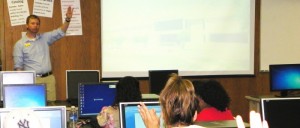Magale Library’s reference and instructional librarians aspire to train students to use library resources to their fullest. Through personal attention and professional training, students learn to conduct research themselves, solve problems, and become lifelong learners. Magale’s information literacy lessons are designed to meet general education requirements of the university as well as discipline and profession-specific requirements and utilize the Association for College and Research Library’s Information Literacy Competency Standards for Higher Education (2000) and Framework for Information Literacy for Higher Education (2015) as a foundation.
Faculty and instructors who wish to schedule Library instruction for their class/classes should contact Del Duke at 870-235-4170 or email him at dgduke@saumag.edu .
Want to learn more about the library’s resources right now? Check Magale’s Video Tutorials!
ACRL Information Literacy Standards (2000)
- Determine the extent of information needed
- Access the needed information effectively and efficiently
- Evaluate information and its sources critically
- Incorporate selected information into one’s knowledge base
- Use information effectively to accomplish a specific purpose
- Understand the economic, legal, and social issues surrounding the use of information, and access and use information ethically and legally
ACRL Framework for Information Literacy for Higher Education (2015)
- Authority Is Constructed and Contextual – Information resources reflect their creators’ expertise and credibility, and are evaluated based on the information need and the context in which the information will be used. Authority is constructed in that various communities may recognize different types of authority. It is contextual in that the information need may help to determine the level of authority required.
- Information Creation as a Process – Information in any format is produced to convey a message and is shared via a selected delivery method. The iterative processes of researching, creating, revising, and disseminating information vary, and the resulting product reflects these differences.
- Information Has Value – Information possesses several dimensions of value, including as a commodity, as a means of education, as a means to influence, and as a means of negotiating and understanding the world. Legal and socioeconomic interests influence information production and dissemination.
- Research as Inquiry – Research is iterative and depends upon asking increasingly complex or new questions whose answers in turn develop additional questions or lines of inquiry in any field.
- Scholarship as Conversation – Communities of scholars, researchers, or professionals engage in sustained discourse with new insights and discoveries occurring over time as a result of varied perspectives and interpretations.
- Searching as Strategic Exploration – Searching for information is often nonlinear and iterative, requiring the evaluation of a range of information sources and the mental flexibility to pursue alternate avenues as new understanding develops.

